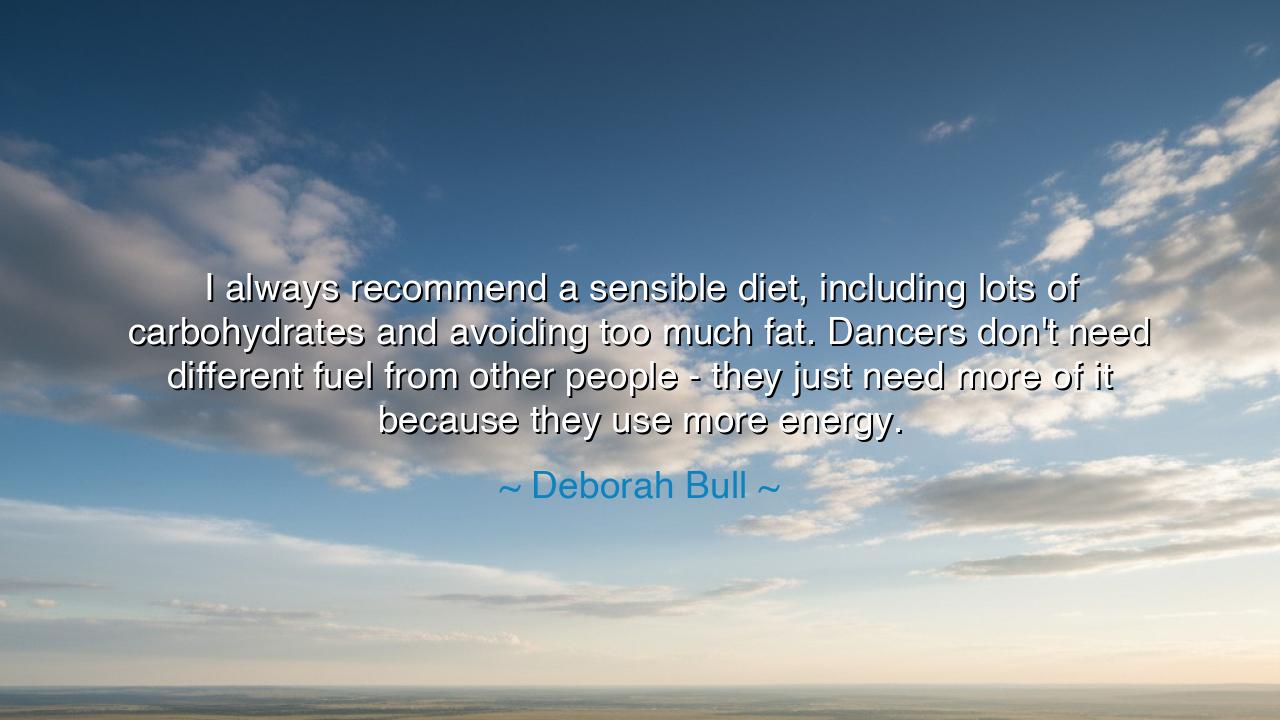
I always recommend a sensible diet, including lots of
I always recommend a sensible diet, including lots of carbohydrates and avoiding too much fat. Dancers don't need different fuel from other people - they just need more of it because they use more energy.






In the ancient wisdom of those who understood the deep connection between the body and its fuel, we find a truth that resonates through the ages: the body requires nourishment, not merely for survival, but to thrive. The wise words of Deborah Bull offer a timeless lesson when she says, "I always recommend a sensible diet, including lots of carbohydrates and avoiding too much fat. Dancers don’t need different fuel from other people—they just need more of it because they use more energy." These words speak to the very heart of our physical being, revealing that the nourishment we give our bodies must reflect the demands we place upon them. In this, she echoes the ancient understanding that health is not about deprivation, but about providing the body with what it needs to fulfill its purpose.
In the ancient world, the greatest warriors, thinkers, and healers understood that the body was a sacred vessel, and to care for it was to honor the soul. The Greeks, who celebrated both physical prowess and intellectual excellence, recognized that the body required nourishment in harmony with its activity. Hippocrates, the father of medicine, spoke of the body’s natural balance, advocating for a diet that was simple yet complete. "Let food be thy medicine," he said, for he understood that a well-nourished body could achieve greatness in both strength and wisdom. Deborah Bull’s words reflect this same ancient wisdom: the body must be treated with care, and it must be given the right fuel—carbohydrates, proteins, and fats—in balance with the work it is called to do.
Consider the ancient Spartans, whose training was legendary for its intensity and rigor. Their physical prowess did not come from a diet of excess, but from a carefully managed, balanced diet that fueled their endurance and resilience. The Spartans understood that the fuel of a warrior’s body was not about indulgence, but about providing the right nutrients for the task at hand. Their meals were often simple, yet rich in carbohydrates—essential for the energy required for their long marches and intense training. The wisdom of their approach is echoed in Deborah Bull’s teaching: a dancer, like a warrior, needs more energy to sustain their efforts, but this energy must come from the right source—carbohydrates that fuel the body for action without excess. This balance allows for both strength and endurance.
The Romans, too, understood the importance of balance in diet. Galen, the great Roman physician, spoke often of the need to nourish the body with a variety of foods—grains, vegetables, fruits, and lean meats. His approach was not about restriction or deprivation but about feeding the body with what it needed for health, vitality, and strength. Much like the dancers of today, the Romans understood that the demands placed on the body require the proper fuel. To avoid excess fat, while ensuring an ample supply of carbohydrates, was a practice that nurtured both strength and vitality, allowing the body to thrive in its many pursuits, whether in battle, sport, or the daily tasks of life.
In Deborah Bull’s advice, we see the ancient understanding that physical activity requires fuel, but that fuel must be chosen wisely. It is not about indulging in excess fat or unnecessary foods, but about nourishing the body with what it requires for optimal performance. Carbohydrates, the body’s primary source of energy, are needed in greater quantities for those who use their bodies in more intense ways—dancers, athletes, warriors. The lesson from ancient cultures is clear: when the body is called to work, it needs a diet that supports its efforts without overloading it with unnecessary or unhealthy foods. By following this balance, we honor the sacred vessel of the body and provide it with what it needs to fulfill its purpose.
Dancers, as Deborah Bull mentions, are no different in their dietary needs than any other person—they simply need more because they use more energy. This is not an indulgence but a necessity. Just as the ancient warriors did not eat excessively but made sure their diet supported their intense physical efforts, dancers must ensure they receive the right nutrients to support their rigorous training and performances. Their bodies, like those of the Spartans and the Romans, are instruments of strength and grace, and to care for them, they must be nourished wisely.
The lesson here, dear listeners, is profound: nourishment is not about restriction or excess, but about balance. Just as Deborah Bull wisely advises, we must ensure that our bodies receive the fuel they need for the tasks we place upon them—whether that be through dancing, working, or living our daily lives. Carbohydrates, proteins, and fats must all be part of a harmonious diet that supports our energy, strength, and resilience. Just as the ancient warriors and philosophers taught us, diet must be seen as a means of empowering the body to fulfill its greatest potential—whether in battle, in art, or in life itself.
So, let us take the wisdom of the ancients and the modern-day insight of Deborah Bull to heart. Let us nourish our bodies with care, choosing foods that fuel us for our endeavors while maintaining the balance that is essential for our health. By doing so, we honor not only the physical body but the spirit that drives us, allowing us to move forward with strength, energy, and purpose, as warriors, as artists, and as human beings.






AAdministratorAdministrator
Welcome, honored guests. Please leave a comment, we will respond soon